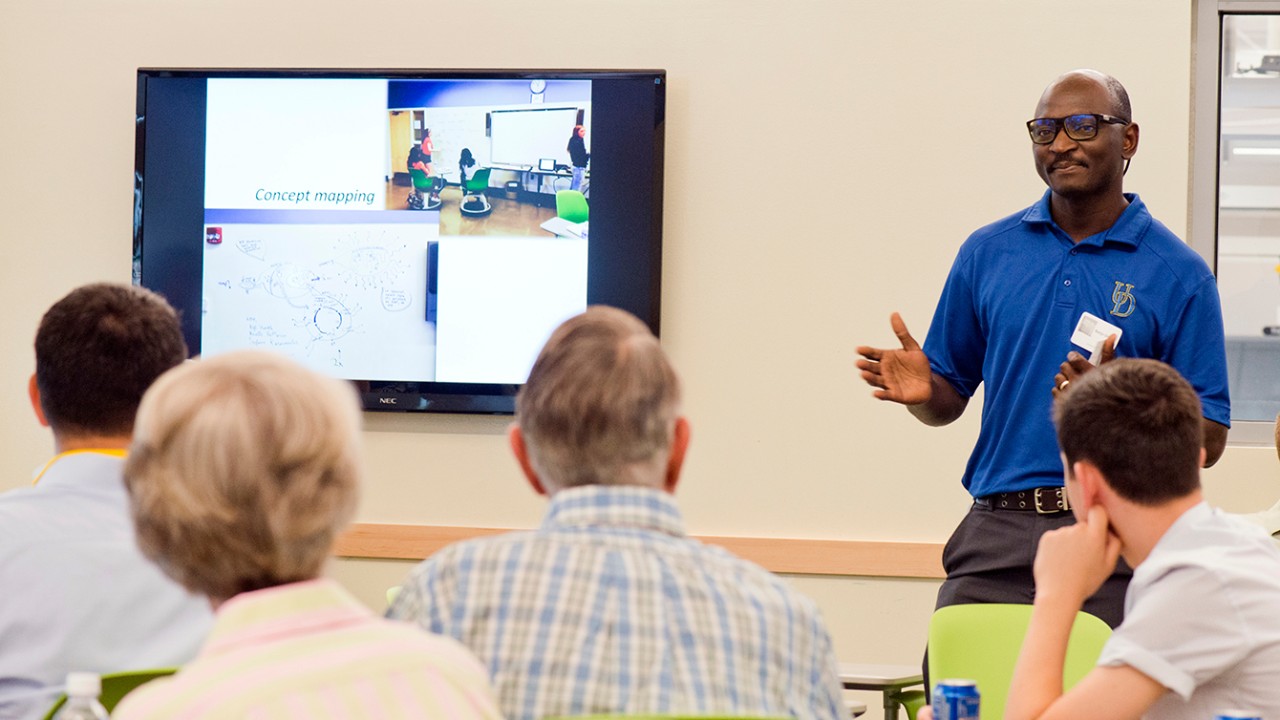


POWER OF PBL
Photo by Lane McLaughlin June 08, 2016
Alumni engage in problem-based learning at UD’s Harker Lab
A group of University of Delaware alumni spent a couple of hours during Alumni Weekend 2016 as students again — but this time, their science class was a demo with a difference.
The alumni, along with friends and a few potential future Blue Hens, gathered in the Harker Interdisciplinary Science and Engineering Laboratory to experience what was billed as “The Power of PBL.”
For most of the participants, it was their first opportunity to see the lab, a research and instructional facility designed for collaboration and experiential learning that opened in 2013. And for many, it was also a novel introduction to problem-based learning (PBL), an instructional method in which students work together to solve complex, real-world problems.
“Learning starts with a problem … the kind of problem that one person can’t solve alone,” said George Watson, dean of the College of Arts and Sciences, who introduced the session. UD has been implementing PBL methods for about 25 years and is now an international leader in teaching other educators about its techniques and benefits, he said.
Watson, who earned his doctorate in physics at UD in 1985, began using PBL in his own teaching in 1997. He told those attending the Alumni Weekend demonstration class that he hoped the combination of Harker Lab and PBL would provide “a signature, first-year experience” for UD students to learn science in an engaging and collaborative way, working in small classrooms with adjoining instructional laboratories.
In “The Power of PBL,” participants got hands-on practice with the kinds of lessons taught by faculty, preceptors and graduate students who lead classes in Harker Lab.
Those alumni and friends assigned to the physics lessons designed and conducted experiments to answer such questions as: Is it possible to drink through a straw if you’re on the moon, where there is no atmosphere? (Their conclusion: No.)
In the biology lesson, participants examined Daphnia magna, a tiny organism commonly known as the water flea, under a microscope and counted its heartbeats. They then exposed it to different compounds to see the effects of each. (A surprise finding: Caffeine appeared to slow the heart rate.)
For Bill Donovan, a 1996 graduate in chemistry, the PBL demonstration class was a highlight of Alumni Weekend, when he also celebrated his 20th reunion year.
“There were some great ideas today, and I’m already planning to steal the ‘straw on the moon’ question for my classes,” said Donovan, a chemistry professor at the University of Akron. “I wanted to see this building, and I’m really impressed with what it has to offer.”
Also enthusiastic about the facilities was Lirija Lulgjuraj, a cybersecurity director who graduated in 2000 with a degree in political science. She attended the PBL session to learn more about Harker Lab and to show it to her son, Logan Henry, a high school student interested in studying physics at UD.
“Getting a problem and finding a way to work with others to solve it — that’s how everything happens in the workplace,” Lulgjuraj said. “This way of learning isn’t just good for science classes, it’s useful for every field.”
Contact Us
Have a UDaily story idea?
Contact us at ocm@udel.edu
Members of the press
Contact us at 302-831-NEWS or visit the Media Relations website

